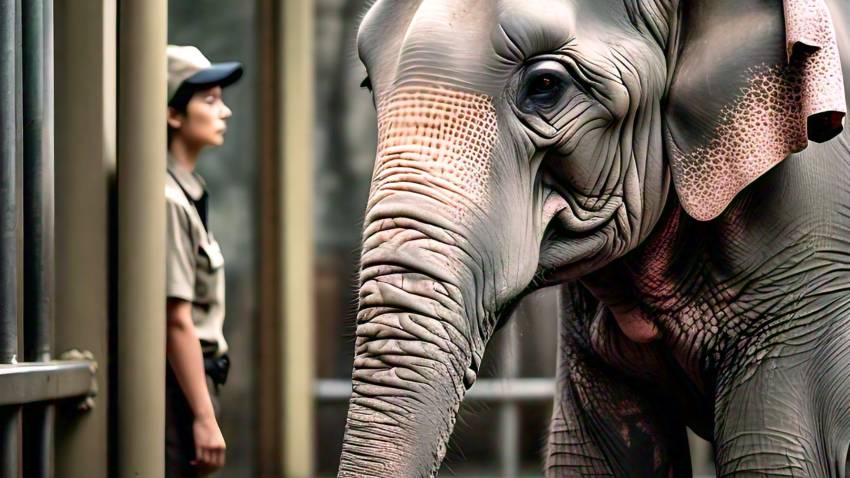A comprehensive peer-reviewed study has found that captive elephants in zoos face persistent welfare challenges, despite recent efforts to improve their living conditions. The research raises fundamental questions about the ethics of keeping these intelligent, social animals in captivity.
Summary: A new study published in Peer J highlights ongoing welfare issues for zoo elephants, suggesting that captive environments may be inherently unsuitable for these complex animals.
Estimated reading time: 6 minutes
Elephants, known for their intelligence, social complexity, and long lifespans, have long been a staple attraction in zoos worldwide. However, a recent study published in the journal Peer J titled “Continuing challenges of elephant captivity: the captive environment, health issues, and welfare implications” casts doubt on the ability of even the most well-intentioned zoos to meet the needs of these magnificent creatures.
The study, led by Catherine Doyle, Director of Science, Research and Public Policy for the Performing Animal Welfare Society (PAWS), synthesized thousands of scientific papers to provide a comprehensive overview of the current state of elephant captivity, primarily in Western facilities.
The Mismatch Between Captivity and Nature
One of the study’s key findings is the stark contrast between the needs of elephants and what zoos can provide. “Elephants have exceptional needs, which are met in nature in huge home ranges that sustain their intricate social networks, wide-ranging movement, and behavioral and cognitive complexity,” Doyle explains. “We found that the considerable mismatch between the captive and natural environment negatively impacts elephant well-being in captivity, with disturbing consequences for these animals.”
This mismatch manifests in various ways, from limited space to inadequate social structures, and has far-reaching implications for elephant health and welfare.
Persistent Welfare Challenges
Despite increased focus on elephant well-being in recent years, the study found that serious welfare issues persist. These include:
- Physical health problems
- Psychological distress
- Abnormal repetitive behaviors (stereotypies)
- Shortened life expectancy
The research suggests that these issues stem from the inherent limitations of the captive environment, rather than a lack of effort on the part of zoos. As Dr. Bob Jacobs, Professor Emeritus at Colorado College, states, “The shortcomings of zoos for elephants are well-documented in this peer-reviewed paper, which contradicts claims that elephants are thriving in captivity.”
Declining Numbers in Zoos
One telling statistic from the study is the decrease in the number of accredited U.S. zoos displaying elephants. Over the past decade, this number has dropped from 67 to 49, reflecting the growing recognition of the challenges involved in providing adequate care for these complex animals.
This trend aligns with the study’s conclusion that limited space and resources are significant factors in zoos’ inability to meet the basic physical and social needs of elephants.
Ethical Implications
The findings of this study raise serious ethical questions about the practice of keeping elephants in captivity. Dr. Lori Marino, Adjunct Professor of Animal Studies at New York University and co-author of the study, doesn’t mince words: “Our assessment demonstrates unequivocally that elephants are suffering severe psychological and physical ailments and unnaturally short lives in zoos.”
The researchers argue that the evidence presented in their paper should prompt a reconsideration of elephant captivity. As Dr. Jacobs concludes, “The confinement of elephants can only be justified by ignoring the incontrovertible scientific evidence, which clearly indicates that elephants do not belong in captivity.”
While the study acknowledges the efforts made by some facilities to improve conditions for captive elephants, it suggests that these improvements may not be sufficient to overcome the fundamental mismatch between elephants’ needs and the captive environment.
As society continues to grapple with questions of animal welfare and ethics, this research provides valuable insights that may shape future policies and practices regarding the captivity of elephants and other highly intelligent, social animals.
Quiz
- According to the study, how many accredited U.S. zoos currently display elephants? a) 67 b) 49 c) 84 d) 31
- What is one of the key factors limiting zoos’ ability to meet elephants’ needs? a) Lack of trained staff b) Limited space and resources c) Climate differences d) Legal restrictions
- Who is the lead author of the study? a) Dr. Bob Jacobs b) Dr. Lori Marino c) Catherine Doyle d) Dr. Jane Goodall
Answers:
- b) 49
- b) Limited space and resources
- c) Catherine Doyle
For further reading:
Glossary of Terms
- Stereotypies: Abnormal repetitive behaviors often seen in captive animals.
- Welfare: The state of an animal’s physical and mental health.
- Accredited zoos: Zoos that meet specific standards set by professional associations.
- Home range: The area in which an animal lives and travels in the wild.
- Sociocognitive factors: Aspects related to social behavior and cognitive abilities.
- Peer-reviewed: A process where research is evaluated by experts in the field before publication.
Enjoy this story? Get our newsletter! https://scienceblog.substack.com/
If our reporting has informed or inspired you, please consider making a donation. Every contribution, no matter the size, empowers us to continue delivering accurate, engaging, and trustworthy science and medical news. Independent journalism requires time, effort, and resources—your support ensures we can keep uncovering the stories that matter most to you.
Join us in making knowledge accessible and impactful. Thank you for standing with us!

